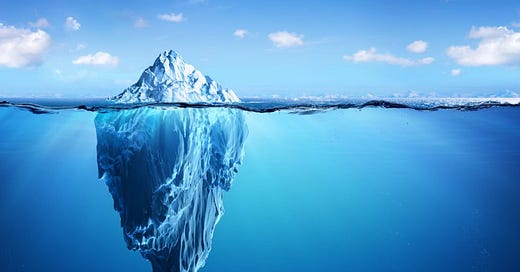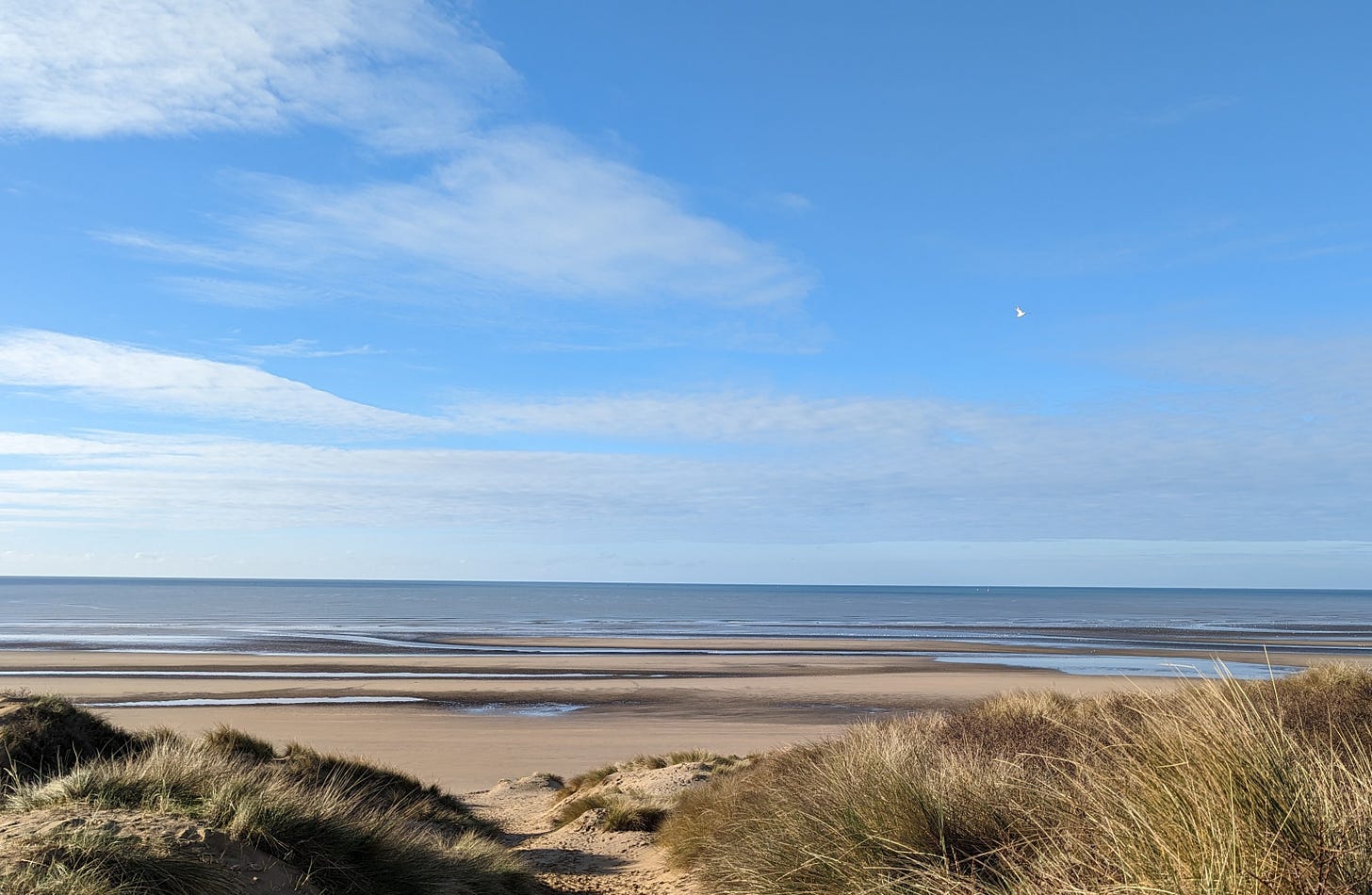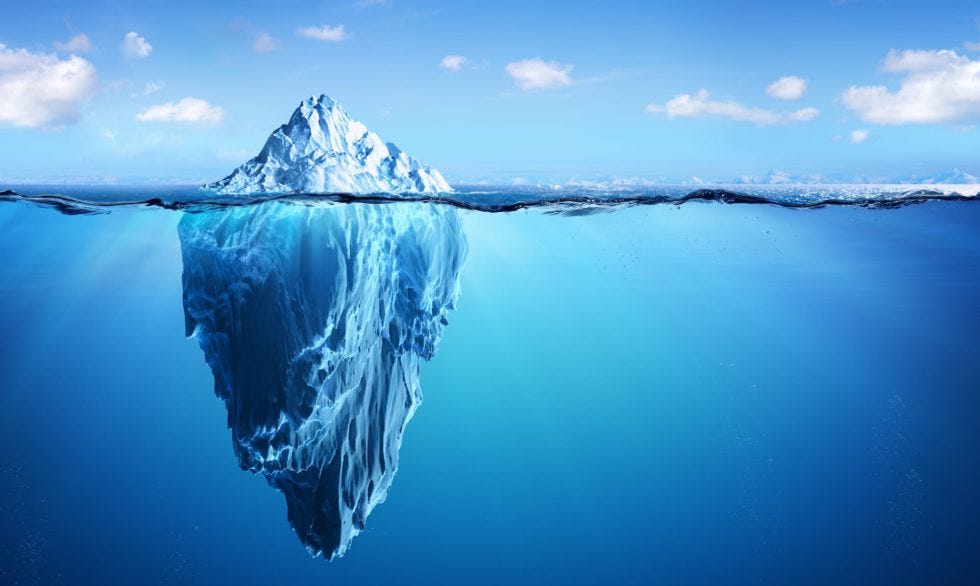
Discover more from "Listening to the Essence of Things": musings on life
What set these thoughts in motion today?
A walk on the deserted beach at low tide, on the first sunny morning in weeks, at the beginning of summer’s time when the clocks change and the dawn advances into the hours.
A weekend spent wrestling with language, watching the savage dramas unfold around the conflict of interpretations over gender, rights, and identities and the relationship between rhetorical and real violence in New Zealand and London. (I’ve just spent time trying to find impartial reports on these incidents but there are none. Choose your media source to confirm your prejudices!)
Finding myself caught up in the midst of these same language issues during a talk I gave at a conference. I wrote an account of that in a separate Substack site which I’ve just started to share my research and questions on gender, without muddying the waters here with those complicated and fretful preoccupations.
Reading Pádraig Ó Tuama’s weekly newsletter which this week is about language and Paul Celan, whose poetry has drawn me back to its dark depths again and again.
Connecting this with listening to Pádraig’s Poetry Unbound podcast on Carolina Ebeid’s poem, “Reading Celan in a Subway Station” poem last week.
Deciding to listen to a podcast about Celan as I walked on the beach, for such listening and reflecting is for me a form of prayer.
So here are today’s random pensées, inspired by the sources listed above, by the cry of the gulls, by the morning sun shimmering on the receding tide, and by the people whose words are part of the world I inhabit, for better or worse, for richer or poorer.
I realize I’m writing a soul diary—reflections, questions, ideas that may or may not find their way into the published book I say I’m researching. I tell my research students and I know from my own research that a thesis or a book is the tip of an iceberg, written atop a submerged mountain of ideas, questions, and insights that never emerge into the light of language, but without which that tip of the iceberg would not exist.
Last week I did Thought for the Day on the theme of artificial intelligence. This connected with questions that I was left with after reading Kazuo Ishiguro’s Klara and the Sun, which I reviewed on GoodReads. How far can artificial intelligence replicate human creativity, and what does this have to do with the soul?
It may be that if I fed these Substack ruminations and ramblings into the right AI gadgetry, it would write the book I’m planning to write—the book to which these as yet undigested and uncoordinated reflections are intended to contribute. Maybe these posts constitute a research diary. (Keep a research diary, we tell our students. Be self-reflective in our thinking and practice, as if we are not already sick of ourselves, nauseous with narcissism, hungry for something other than the self to give meaning to the world). If I ever write that book it will be the tip of this iceberg, and the deep, dark blue of thought and feeling that are going into it will never see the light of day. But without the iceberg, the tip would drift, untethered and lacking in depth, until it too would simply melt and disappear. So maybe the iceberg is the soul, and the tip is only what is seen and can be spoken of, even by artificial intelligence, for it is all on the surface, and that is a very small part of what is there.
Words create worlds. To recreate the world we must choose our words carefully. The Word is spoken, and thus the world speaks. We no longer know how to listen to the world so that it can breathe and speak through us, so that we can bestow meaning upon it by allowing it to bestow its meaning upon us. We forget that speech involves bodies—tongues, lips, and throat, (I must use the Oxford comma for ultimately this may become an OUP book), the soft enfoldings of the brain, the rising and falling of our lungs, blood pulsing through us, and the food that sustains us, the world that flows into us through sight and sound, touch and smell and taste, gestating in darkness until words are ready to be born on the wings of desire and the deadly undertow of fear and prohibition.
Words are never pure, for they emerge from the tangled complexities of our own souls, and they are heard by others whose souls are also tangled and complex. They rise to speech through turbulent ocean depths where horrors and monsters lurk, and they bear with them the memories of all the other monstrous beasts that have consumed meaning again and again and again since the Word was spoken and the world began, hissing and writhing and seducing us into dark forbidden worlds where violence lurks.
Adorno asks, is it not barbaric to write poetry after Auschwitz? Celan responds that we have no alternative but to write poetry after Auschwitz for the world must be created anew and for that words are necessary. I ask myself, is it possible to find joy after Auschwitz? But we must find joy, or the survival is all in vain. The only obligation we have today is to rescue hope from the wreckage, and joy from the desolation. For that, faith is necessary, but what is faith if not another word for the arduous, impossible, failing and falling vocation to love without end, perfectly and unconditionally, seeking to have and to give that love beyond all human loving, love divine, all love’s excelling?
To recreate a world capable of sustaining life we must choose our words carefully, with love (which can be a sword that divides as well as a balm that consoles), we must rediscover that there is a time to speak and a time to be silent, for as we speak so the world speaks, and there is always more to be said than can ever be said, more to be written than can ever be written. The ur language subtends all that is —the vast oceanic edifice far beneath the surface that sustains the shimmering glistening melting ice cap. We must listen to the language that speaks in silence beyond all languages, the silence out of which all words and all worlds emerge from a single Word that creates worlds of words. If we do not listen, we are robots generating words that proliferate without worlds, an endless babel of noise that never plumbs the depths where the pentecostal spirit hides.
The rabbis speak of the Torah as black fire written on white fire. We write upon the white blaze of the unknown. Silence is the white fire—the silence, the spaces, the subtending presence—that graciously yields to the pen and the tongue so that humans can speak of that which we cannot and should not speak of, so that we can form words into which the white fire breathes its meanings. What we call revelation is a process of concealment, for it is the withdrawal of the fullness of being so that beings might become. But we yearn for that plenitude, and so we speak of that which we should not speak of—the forbidden fruit, the forbidden word, the departed divine, the lost chord. Pamela Sue Anderson was a philosopher and a beloved friend who died too young. At her funeral, a tenor sang The Lost Chord. It was such a perfect choice for a philosopher’s farewell.
When we transgress the taboo—when we speak of that which should render us silent—we must honour that which has departed in order to allow us to use language, to speak truthfully, and truth asks that we dare to breach the prohibition—the censor, the taboo, the silencer.
The enfleshing Word comes birthing and seeping and bleeding into the gaps. But we have broken the fragile threads of grace that weave together bodies and language and allow enough spaces—enough white fire—for others to be and to breathe, for the Other beyond all others to be and to breathe, beyond the control of any words we can find, any language we can share, any revelation we can speak of.
Edwin Muir’s lines come to mind—“the Word made flesh is here made word again”—and words and the world go on. We must find a new nuptials between them, lest we dissolve and disappear with the melting icecaps.















